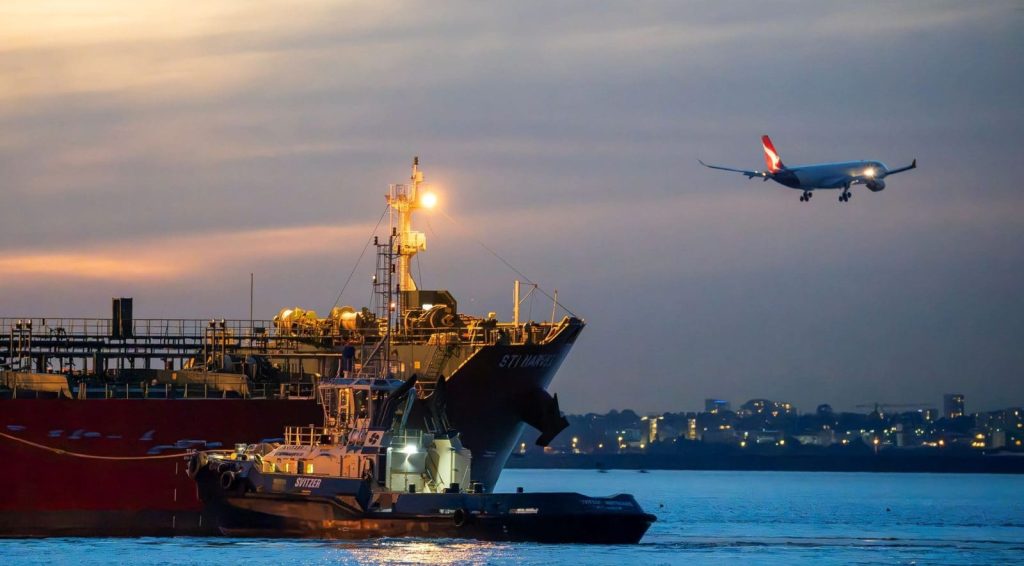
The tanker carrying 1.8 million litres of SAF arriving at Ampol’s Kurnell facility earlier this month. Photo: Qantas, Kurt Ams
QANTAS, Sydney Airport and Ampol have marked Australia’s largest commercial import of sustainable aviation fuel (SAF), with nearly two million litres arriving on May 7.
The milestone has underscored growing domestic demand for sustainable aviation fuel, prompting renewed calls from industry for Federal Government policy support to help establish local manufacturing capacity.
Proponents of domestic SAF and renewable fuel production, including GrainCorp, have highlighted potential benefits for the grains sector, with canola already used as a feedstock and emerging crops like carinata and pongamia showing promise.
In the GrainCorp half year to March 31 results presentation on Thursday, chief executive officer and managing director Robert Spurway indicated the company’s proposed crush plant would only proceed once sufficient demand was confirmed to justify the investment.
Record SAF importation
The record SAF shipment was imported by Ampol from Malaysia to its Kurnell facility, and is currently being blended with conventional aviation fuel before testing and certification so that it can be distributed into the Sydney Airport supply chain.
It will then be used on flights departing from Sydney Airport over coming weeks.
Sydney Airport chief executive officer Scott Charlton said the airport accounted for nearly 40 percent of Australia’s total aviation fuel uplift, giving it “a big opportunity to be a leader in the development of a domestic SAF industry”.
Mr Charlton said New South Wales’ strong canola-growing capacity made it a logical location for establishing a domestic SAF manufacturing industry.
“NSW is uniquely placed to develop this industry, as a major producer of important feedstocks like canola,” Mr Charlton said.
“Most of Australia’s canola harvest currently goes offshore to be turned into biofuels by other nations.
“With the right policy settings at a state and federal level, and governments working in partnership with industry, NSW can become a global leader on SAF – creating local jobs, supporting local industry, and fuelling more sustainable flights in the future.”
Qantas Group CEO Vanessa Hudson said the milestone was a proud moment for the company and the impact of collaboration across industries to achieve decarbonisation.
“We pick up 70pc of our fuel in Australia so we’re looking forward to working closely with the government to chart the next course for SAF in Australia,” Ms Hudson said.
“The alignment of industry and government will be critical to establishing and scaling an industry here.”
In response, the recently returned Federal Minister for Infrastructure, Transport, Regional Development and Local Government Catherine King said the announcement was “a vote of confidence in the sector and a signal that demand is there” for SAF.
She said the government was “committed to providing the support” required to develop a domestic sustainable fuels industry.
“We made progress in our first term of government to develop a low carbon liquid fuel industry on our shores, and we look forward to building on that work as we build Australia’s future,” Ms King said.
GrainCorp crush plans
SAF importer Ampol is also a signatory to a memorandum of understanding with GrainCorp and IFM Investors to progress domestic renewable fuels industry.
The group is progressing the feasibility assessment for a renewable fuels facility, with capacity to produce over 450 million litres annually, at Ampol’s Lytton Refinery in Brisbane.
The MOU also includes working with GrainCorp to explore the supply of homegrown feedstocks, including increased crushing capacity for canola oil to the future plant.
GrainCorp is currently targeting a front-end engineering design phase in 2026, but this would be subject to favourable policy to accelerate supply and demand of low-carbon liquid fuels.
During the HY25 announcement, Mr Spurway noted the announcement by Qantas, Ampol and Sydney Airport commenting that this demonstrated the presence of demand from SAF consumers.
“It makes absolute sense over the medium term to see that demand manufactured in Australia, which will provide better economic outcomes, better carbon intensity outcomes and the opportunity for investment and job creation in Australia,” Mr Spurway said.
“We have an existing MOU with our partners in Ampol, IFM and we continue to work together with them on the deliverables of that MOU, particularly around developing an opportunity for supply to Ampol in the event that they convert the refinery in Brisbane to process renewable fuels.
“This also requires bringing many parts of the industry together, including having the right government policy frameworks in place.
“As we’ve always said, GrainCorp’s investment in a future crush plant will be reliant on the demand being in place.”
Mr Halliday echoed the calls for Federal Government intervention or signals during Ampol’s annual general meeting held on Thursday.
He said the work to develop a potential renewable fuels refinery at Lytton had “progressed to the pre-FEED study phase”.
“As is the case in other countries, the establishment of a renewable fuels industry in Australia requires effective policy to support both local demand and local supply, and this is an area we will continue to work on with government, together with our partners and our customers.”

HAVE YOUR SAY